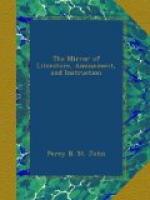“Our humble household is but small,
And I, alas! must look to all.
We have no maid, and I may scarce avail
To wake so early and to sleep
so late;
And then my mother is in each detail
So accurate."[3]
If people of fashion knew at what cost some of their imaginary wants are gratified, it is possible that they might be disposed to forego the gratification: it is possible, also, that they might not. On the one hand they are not wanting in benevolence to the young and beautiful; the juster charge against them being, that their benevolence extends no farther. On the other hand, unless there be a visual perception of the youth and beauty which is to suffer, or in some way a distinct image of it presented, dissipation will not allow them a moment for the feelings which reflection might suggest:
“Than vanity there’s nothing
harder hearted;
For thoughtless of all sufferings unseen,
Of all save those which touch upon the
round
Of the day’s palpable doings, the
vain man,
And oftener still the volatile woman vain,
Is busiest at heart with restless cares,
Poor pains and paltry joys, that make
within
Petty yet turbulent vicissitude.”
[3] Faust: Lord F.L. Gower’s translation.
* * * * *
NEW BOOKS.
LEGENDS OF THE LIBRARY AT LILIES. BY THE LORD AND LADY THERE.
[These are two volumes of tales and sketches from the pens of Lord and Lady Nugent, whose literary recreations have not unfrequently graced the fair pages of our Annuals. They are ushered in by a few pleasant words “by way of advertisement,” describing in four pages the delights of his Lordship’s rural retirement at Lilies, in Buckinghamshire; and this portion of the work is so inviting that we quote it.]
If you would place yourself just midway between the three seas which form the boundaries of southern England, you shall find yourself on a small knoll, covered with antique elm, walnut, and sycamore trees, which rises out of a vale famous in all time for the natural fertility of its soil, and the moral virtues of its people. On this knoll, fitly called by our ancestors “the Heart of South Britain,” stood, distant about half a mile from each other, two monasteries, known by the flowery appellatives of Lilies and Roses; not unaptly setting forth a promise of all that can recommend itself as fair and sweet unto the gentler senses. These edifices have, for many centuries, been no more; but, on the site of the first mentioned of the two, standeth a small mansion, of Tudor architecture, bearing still its ancient name. Of the monastery little memorial, beyond the name, remains; save only that under a small enclosed space, erewhile its cemetery, now a wilderness of flowers, the bones of the monks repose. Two lines of artificial slope to the westward mark the boundaries of the pleasaunce, where they took their recreation, and cultivated their lentils and fruits; and a range of thickly-walled cellar still retains the same destination and office as when it furnished to those holy men their more generous materials of refection.




